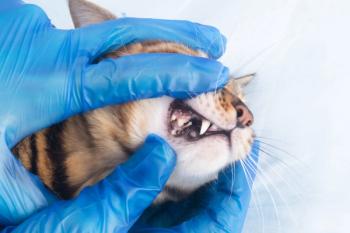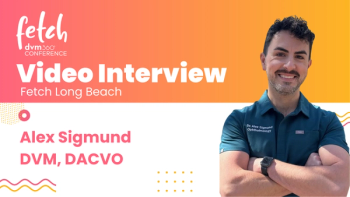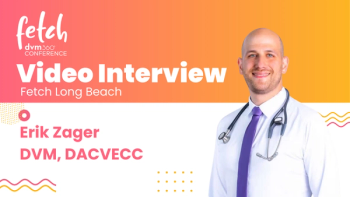
Student veterinary technicians explore zoo medicine and other career options
The first Vet Tech Summit at the Elmwood Park Zoo in Pennsylvania was attended by more than 50 students from 3 area colleges.
Veterinary technician students recently met at the Elmwood Park Zoo (EPZ) in Norristown, Pennsylvania, for a day of learning, leadership, and inspiration. The special event was the zoo’s first Vet Tech Summit, which drew more than 50 second-year students from Manor College in Jenkintown, Pennsylvania; Harcum College in Bryn Mawr, Pennsylvania; and Camden County College in Blackwood, New Jersey; as well as industry leaders and professional veterinary technicians.
Held in partnership with the Zoetis animal health company, the summit held during National Veterinary Technician Week provided attendees with tours of the Frank and Paige Engro Veterinary Health Center led by EPZ veterinary technicians, who spoke about their day-to-day experiences. “Every day is different for us in the veterinary department here at the zoo. We will work on a wide range of animal species, from tiny little frogs, all the way up to our giraffes,” Michele Goodman, VMD, attending veterinarian at EPZ, said in a dvm360 interview.
“We want to show [the students] the work that we’re able to do here to provide excellent care to our animals, which is not only on the veterinary department but also working with our keepers and our educators to do behavioral husbandry or…conditioning on a lot of our animals. That enables us to work on many more animals without anesthesia, so we let them choose to participate in their own care,” she added.
Goodman and Stephanie Marks, DVM, FVTE, program director of veterinary technology at Manor College, both said one of the Vet Tech Summit’s goals was to highlight some of the different career opportunities available to the students after they graduate. “The zoo is a unique career opportunity for a technician. It’s not where the majority go. Many are interested, but they don’t necessarily end up there…. There’s so much you can do to take advantage of [your degree],” Marks added.
As part of the summit, students heard from industry panelists about a variety of career options open to veterinary technicians, listened to a presentation about innovations with monoclonal antibodies, networked with industry leaders and peers, and visited animals in residence.
RELATED:
During the panel discussion, veterinary technicians represented a variety of different career paths such as entrepreneurship, academia, and roles outside traditional veterinary practices such as zoo medicine. Panelists included Alyssa Mages, BS, CVT, FVTE, an owner and educator with Empowering Veterinary Teams LLC, based in Philadelphia, Pennsylvania; Bailey Donovan, BS, CVT, a specialist in teaching and veterinary learning technology at the University of Wisconsin School of Veterinary Medicine in Madison; and Kourtney Conti, CVT, a veterinary team member at EPZ.
“Traditional roles within a general practice or within an [emergency department] and specialty practice, are not the only things we can do. Once you get your credentials as a CVT, LVT, LVMT, or RVT, you can do anything—literally anything,”
Jodi Koch, VMD, a managing professional services veterinarian with Zoetis, gave the presentation on monoclonal antibodies. In an interview with dvm360, she said one key takeaway from the lecture is that veterinary medicine is a team sport that relies on technicians. “They are just as important as the veterinarian, and especially as innovation continues within the veterinary space, they’re going to be so much more heavily involved in the diagnosis. They’re becoming even more of an integral part of patient management,” Koch said.
That sentiment was echoed by Marks. “Veterinary technicians are absolutely critical to the entire veterinary health profession. We veterinarians cannot do our job without them. It’s impossible. They are our eyes and ears on a lot of what’s happening as we are working with clients or in surgery or something else. They are absolutely critical for the most efficient functionality of the practice,” Marks said.
Laura P. Clark, DVM, PhD, who works in academic global medical affairs with Zoetis and serves as an EPZ board member, said that another goal of the summit is to ensure that veterinary technician students know that they matter and their voice matters. “I want them to know that there are so many things that these talented young students and future veterinary technicians can do. If they can think it, they can be it,” Clark said in a dvm360 interview.
Summit organizers said they are planning to annually hold the event. Clark noted that her goal is to keep increasing the number of participating schools to reach more students. “This year, we have the privilege of working on 3 programs. I’d like to advance that to 6 programs next year [and] maybe 9 programs in the third year. [I’d like to] continue this because this is such a unique but wonderful opportunity to offer something different and novel,” Clark said.
Reference
Exploring career options for veterinary technicians. dvm360. October 17, 2025. Accessed October 23, 2025.
Newsletter
From exam room tips to practice management insights, get trusted veterinary news delivered straight to your inbox—subscribe to dvm360.






